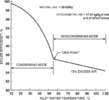- Joined
- 17 Aug 2010
- Messages
- 2,758
- Reaction score
- 573
- Country

How accurate are the efficiency ratings given to boilers ? Mine is Mexico Super CF 3/70 and is rated here as 72.7%
Many new condensing boilers are rated considerably higher but how accurate are these figures in reality. If I was to get a modern boiler of 92.7% that would give me a mathematical saving of 21.5% - and if I assumed another 50% increase in gas prices the pay back on a £2,500 boiler would be just over 5 years. This sounds worthwhile but how would it work out in reality? going from 72.7% to 92.7% would I really get a 21½% reduction in gas use...
Many new condensing boilers are rated considerably higher but how accurate are these figures in reality. If I was to get a modern boiler of 92.7% that would give me a mathematical saving of 21.5% - and if I assumed another 50% increase in gas prices the pay back on a £2,500 boiler would be just over 5 years. This sounds worthwhile but how would it work out in reality? going from 72.7% to 92.7% would I really get a 21½% reduction in gas use...

